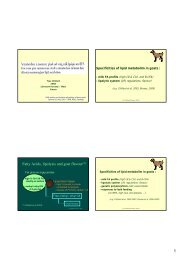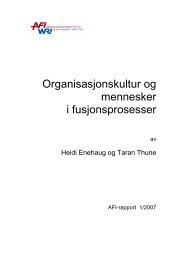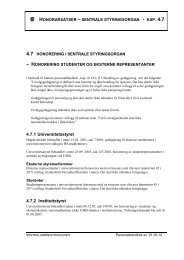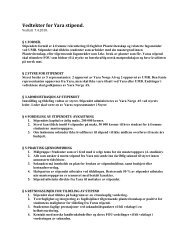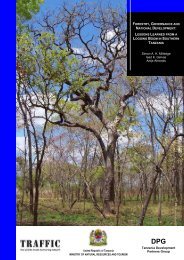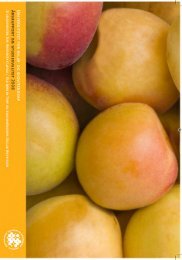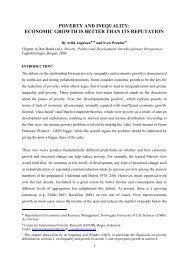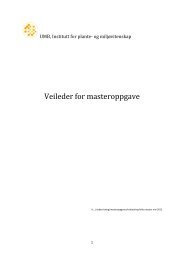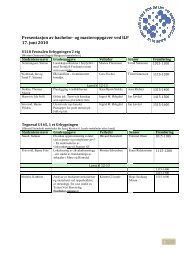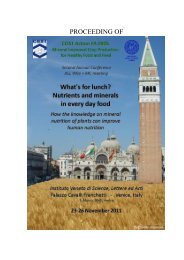Sustaining Livelihoods through Organic Agriculture in Tanzania - UMB
Sustaining Livelihoods through Organic Agriculture in Tanzania - UMB
Sustaining Livelihoods through Organic Agriculture in Tanzania - UMB
You also want an ePaper? Increase the reach of your titles
YUMPU automatically turns print PDFs into web optimized ePapers that Google loves.
Chapter Eight: Challenges to the Development of <strong>Organic</strong> <strong>Agriculture</strong> <strong>in</strong><br />
<strong>Tanzania</strong><br />
Notwithstand<strong>in</strong>g its many benefits, organic farm<strong>in</strong>g carries attendant risks and<br />
challenges which also merit consideration if the sector is to be responsibly developed.<br />
These relate to production, labour, gender, market-orientation, and the policy and<br />
<strong>in</strong>stitutional framework.<br />
8.1 Production<br />
<strong>Organic</strong> farmers face many of the same production constra<strong>in</strong>ts as conventional<br />
farmers <strong>in</strong> relation to climate, labour requirements, pest and diseases, land tenure,<br />
distance from markets, <strong>in</strong>frastructure, credit, education and other <strong>in</strong>puts. In particular,<br />
the <strong>in</strong>creas<strong>in</strong>gly erratic nature of the ra<strong>in</strong>s—fieldwork followed an eight-month<br />
drought <strong>in</strong> most parts of the country—is a source of major concern for all farmers <strong>in</strong><br />
the country, irrespective of their wealth and the size of their landhold<strong>in</strong>gs.<br />
For the bioRe organic cotton project failure of the ra<strong>in</strong>s has meant that farmers have<br />
had to use three times the normal quantity of seed. The vast majority of producers rely<br />
on ra<strong>in</strong>fed agriculture and lack the necessary knowledge and resources to develop<br />
efficient ra<strong>in</strong>water harvest<strong>in</strong>g and irrigation systems. Furthermore, burn<strong>in</strong>g and<br />
deforestation are commonly used practices which threaten soil and water resources<br />
and are contribut<strong>in</strong>g to flash floods.<br />
Pest and disease outbreaks present a substantial risk to those organic farmers without<br />
sufficient knowledge or access to biopesticides. Certa<strong>in</strong> pests such as armyworms<br />
(Spodoptera exempta), quelea quelea and verm<strong>in</strong> are particularly difficult to control<br />
without the use of toxic chemicals.<br />
Without security of land tenure, organic farmers are much less likely to make longterm<br />
<strong>in</strong>vestments <strong>in</strong> their operations. Thus unclear borders and land conflicts, often<br />
exacerbated by limited water resources, are a significant threat to the development of<br />
organic agriculture. Even where farm boundaries are well-def<strong>in</strong>ed, fire can spread fast<br />
across neighbour<strong>in</strong>g farms and, <strong>in</strong> the case of organic cashew production, causes<br />
severe damage to both seedl<strong>in</strong>gs and mature stands.<br />
In spite of <strong>in</strong>creased management <strong>in</strong>tensity, organic practices may <strong>in</strong>itially reduce<br />
yields <strong>in</strong> the beg<strong>in</strong>n<strong>in</strong>g <strong>in</strong> areas where <strong>in</strong>put-<strong>in</strong>tensive agriculture has been practised<br />
(EPOPA, 2004). The uptake of organic agriculture may impact negatively on the<br />
productivity of crops that have been cultivated us<strong>in</strong>g chemically-<strong>in</strong>tensive methods<br />
<strong>in</strong>clud<strong>in</strong>g coffee and some vegetables. Non-traditional crops and fruit are generally<br />
lighter users of <strong>in</strong>puts and therefore experience less change (D. Nyange 2006, pers,<br />
comm., 16 January). Such impacts need more careful research <strong>in</strong> order to address<br />
fears about the ability of organic agriculture to meet the production levels needed to<br />
feed a grow<strong>in</strong>g population.<br />
There are a whole host of counterpo<strong>in</strong>ts to concerns over productivity decl<strong>in</strong>es <strong>in</strong><br />
organic systems. Experience has shown that ‘organic methods reduce output<br />
proportionately less than they reduce costs’ mak<strong>in</strong>g the farmer better off (McRobie: <strong>in</strong><br />
Blake, 1987). Lampk<strong>in</strong> (1990: 595) comments that ‘far from threaten<strong>in</strong>g the<br />
populations of develop<strong>in</strong>g countries with mass starvation, ecological methods such as<br />
50



